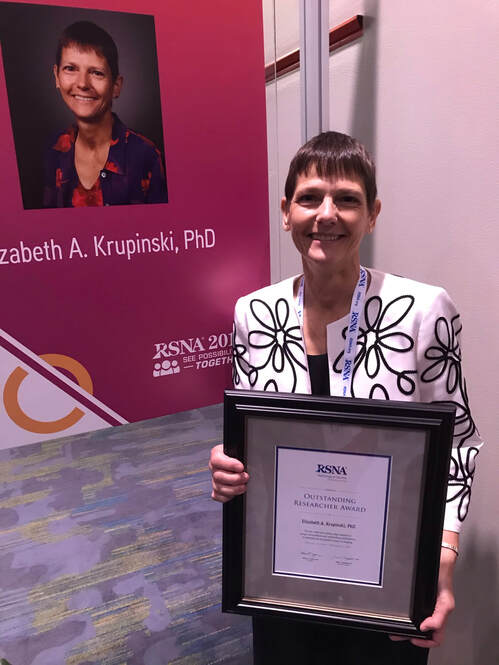Elizabeth krupinski Receives RSNA's Top Research Honor
by Mohsina Yusuf

Elizabeth Krupinski, PhD, is the vice chair for research for the Department of Radiology and Imaging Sciences here at Emory. She also happens to be one of the most internationally-renowned investigators in medicine. Dr. Krupinski is involved in radiology, telemedicine, psychology, human factors, and biomedical informatics and much of her research focuses on perception and cognition in medical imaging. In December, she was recognized by the Radiological Society of North America (RSNA) for her contributions to the field by receiving the 2019 Outstanding Researcher Award.
Dr. Krupinski received her bachelor’s degree from Cornell University, a master’s degree in experimental psychology from Montclair State University, and her PhD (also in experimental psychology) from Temple University. She was frequently recognized for her research throughout her training, having received the Most Outstanding Psychology Graduate Student and Most Outstanding Graduate Student in Arts and Sciences while she was completing her master’s degree. She also completed her postgraduate training at the University of Pennsylvania’s Department of Radiology.
Her research explores the effects of image manipulation on clinical observer performance and has investigates conditions such as experience level and fatigue and how it impacts accuracy and efficiency. Dr. Krupinski has brought her leadership to several medical imaging organizations. She has served as a chair for the SPIE Medical Imaging Conference, president of the American Telemedicine Association (ATA), president of the Medical Image Perception Society, and chair for the Society of Imaging Informatics in Medicine (SIIM). She also contributed to more than 280 peer-reviewed scientific publications and is a co-editor for the Journal of Telemedicine and Telecare.
Her recognition as the 2019 Outstanding Researcher Award recipient is well-deserved.
“It was such an honor to receive this prestigious award recognizing the importance of medical image perception and human factors research in radiology and the contributions it can make to improving patient care and the well-being of radiologists interpreting their images,” said Dr. Krupinski. “None of my research would have been possible over the years without the collaboration and participation of so many radiologists, trainees and other investigators here at Emory, the University of Arizona, the University of Iowa and the University of Pennsylvania (where I was introduced to and mentored in this exciting area). My thanks and gratitude go out to everyone who ever participated in my studies and the support I have received here at Emory and elsewhere over the years.”
Dr. Krupinski received her bachelor’s degree from Cornell University, a master’s degree in experimental psychology from Montclair State University, and her PhD (also in experimental psychology) from Temple University. She was frequently recognized for her research throughout her training, having received the Most Outstanding Psychology Graduate Student and Most Outstanding Graduate Student in Arts and Sciences while she was completing her master’s degree. She also completed her postgraduate training at the University of Pennsylvania’s Department of Radiology.
Her research explores the effects of image manipulation on clinical observer performance and has investigates conditions such as experience level and fatigue and how it impacts accuracy and efficiency. Dr. Krupinski has brought her leadership to several medical imaging organizations. She has served as a chair for the SPIE Medical Imaging Conference, president of the American Telemedicine Association (ATA), president of the Medical Image Perception Society, and chair for the Society of Imaging Informatics in Medicine (SIIM). She also contributed to more than 280 peer-reviewed scientific publications and is a co-editor for the Journal of Telemedicine and Telecare.
Her recognition as the 2019 Outstanding Researcher Award recipient is well-deserved.
“It was such an honor to receive this prestigious award recognizing the importance of medical image perception and human factors research in radiology and the contributions it can make to improving patient care and the well-being of radiologists interpreting their images,” said Dr. Krupinski. “None of my research would have been possible over the years without the collaboration and participation of so many radiologists, trainees and other investigators here at Emory, the University of Arizona, the University of Iowa and the University of Pennsylvania (where I was introduced to and mentored in this exciting area). My thanks and gratitude go out to everyone who ever participated in my studies and the support I have received here at Emory and elsewhere over the years.”
Proudly powered by Weebly